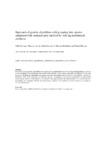Approach of Genetic Algorithms With Grouping Into Species Optimized With Predator-Prey Method for Solving Multimodal Problems

Ver/Abrir
Use este enlace para citar
http://hdl.handle.net/2183/20863Colecciones
- Investigación (FIC) [1685]
Metadatos
Mostrar el registro completo del ítemTítulo
Approach of Genetic Algorithms With Grouping Into Species Optimized With Predator-Prey Method for Solving Multimodal ProblemsFecha
2012Cita bibliográfica
Seoane P, Gestal M, Dorado J, Rabuñal JR, Rivero D. Approach of genetic algorithms with grouping into species optimized with predator-prey method for solving multimodal problems. Ponencia presentada en: DCAI 2012. 9th International Conference on Distributed Computing and Artificial Intelligence; 2012 Mar 28-30; Salamanca (Advances in Intelligent Soft Computing; 151)
Resumen
[Abstract] Over recent years, Genetic Algorithms have proven to be an appropriate tool for solving certain problems. However, it does not matter if the search space has several valid solutions, as their classic approach is insufficient. To this end, the idea of dividing the individuals into species has been successfully raised. However, this solution is not free of drawbacks, such as the emergence of redundant species, overlapping or performance degradation by significantly increasing the number of individuals to be evaluated. This paper presents the implementation of a method based on the predator-prey technique, with the aim of providing a solution to the problem, as well as a number of examples to prove its effectiveness.
Palabras clave
Genetic algorithms
Multimodal problems
Species evaluation
Predator-Prey approach
Multimodal problems
Species evaluation
Predator-Prey approach
Versión del editor
Derechos
The final publication is avaliable at Springer Link
ISSN
1867-5662
1867-5670
1867-5670
ISBN
978-3-642-28764-0 978-3-642-28765-7





